Americans report on their paranormal experiences in their home. [Survey]

Key takeaways:
- 83% of Americans experienced paranormal activity in their home
- The top three forms of paranormal activity were hearing sounds, lights turning on and off and hearing voices
- 1 in 10 people reported selling their home after a paranormal experience
Americans share their haunted house stories
Have you ever heard a noise in your home that you couldn't explain? Maybe you've even seen the lights flicker in a way that suggests something sinister. Or maybe, like some Americans, you're sure your house is haunted.
After speaking to over 800 people across the country who have had explicit, self-diagnosed paranormal experiences, we're ready to share their spooky data. We asked about the types of houses these hauntings took place in, what respondents' experiences were and how they reacted. We also turned to the population at large to see how Americans who hadn't yet had a supernatural experience would feel about it if they did. Keep reading, if you dare.
What does a haunted house truly look like?
Our study dives in with a look at the most common attributes of haunted houses. We also noted factors like house size, age, location and even inhabitants' previous beliefs about paranormal activity.
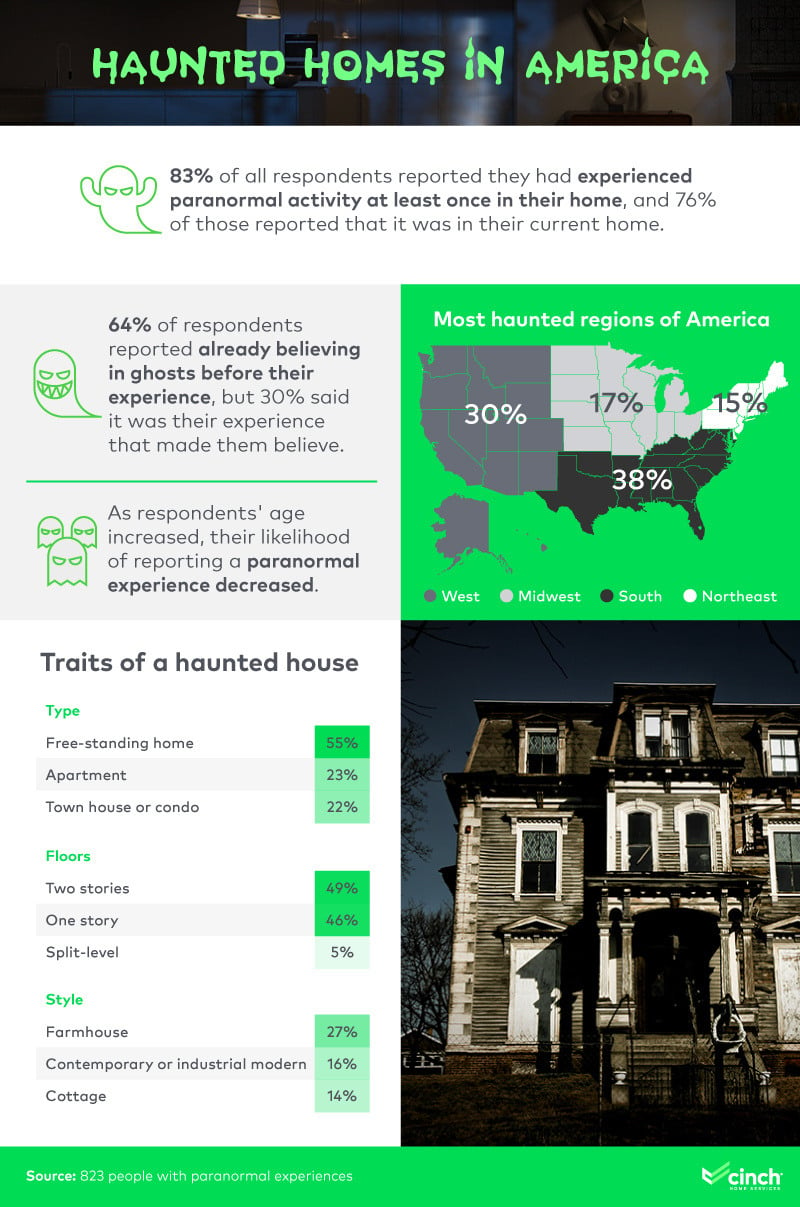
More than three-quarters of people who had experienced paranormal activity were still residing in the very same residence where it occurred, suggesting that hauntings aren't always as bad as the movies make them seem. That said, there were particular traits of haunted homes that people who want to avoid them should look out for.
Most hauntings occurred among respondents with free-standing homes (55%) as opposed to apartments and condos. Two-story farmhouses were also the most likely targets for horrifying happenings, which is reflected in mainstream pop culture. We also found that respondents in the South of the U.S. reported ghostly experiences most often. 
Red flags
Moving on to the experience itself, we wanted to know what respondents had heard about the house before moving in, and what (if any) triggers they thought might have invited supernatural forces inside.
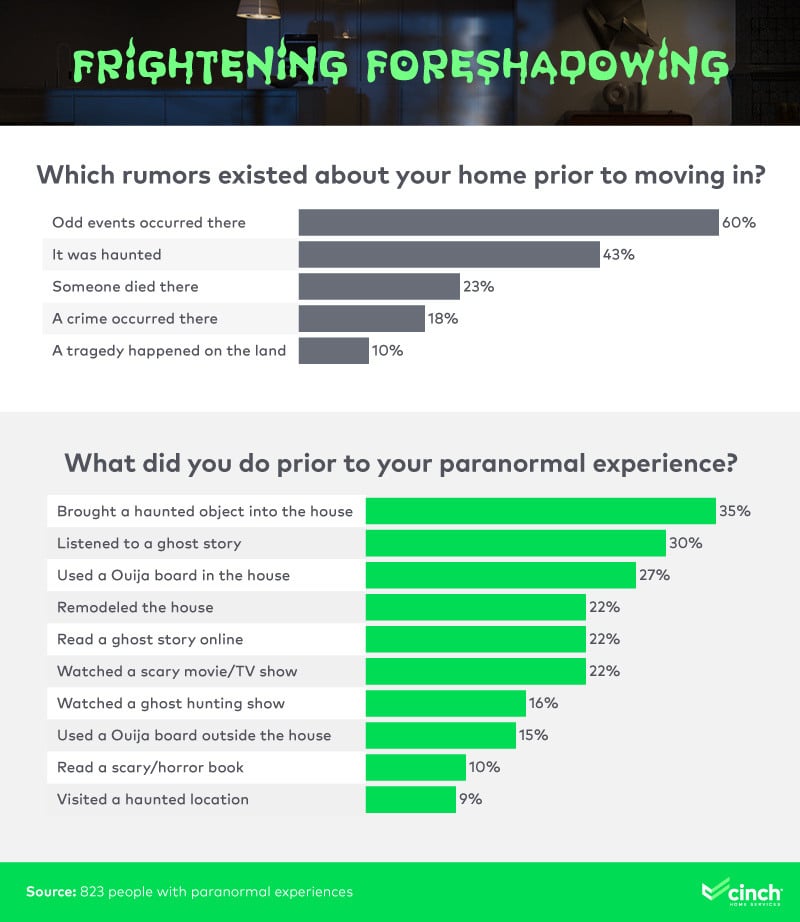
Most people weren't haunted entirely without warning. Instead, the majority (60%) had at least heard rumors about odd experiences happening in the home, while an additional 43% had explicitly heard that the place was haunted. We also found that rumors of a death or crime having taken place there often correlated with reports of paranormal activity later on.
When we asked about possible catalysts, more than a third admitted to bringing a haunted object into the house with them, while 30% had recently listened to a ghost story. Ouija boards were also involved in 27% of cases when used in the home and 15% of cases when used in a separate location. 
Haunted happenings
So what actually happened to the respondents who said they had witnessed paranormal activity? This section of our study ranks the most common experiences respondents had with supernatural beings, as well as whether there were witnesses.
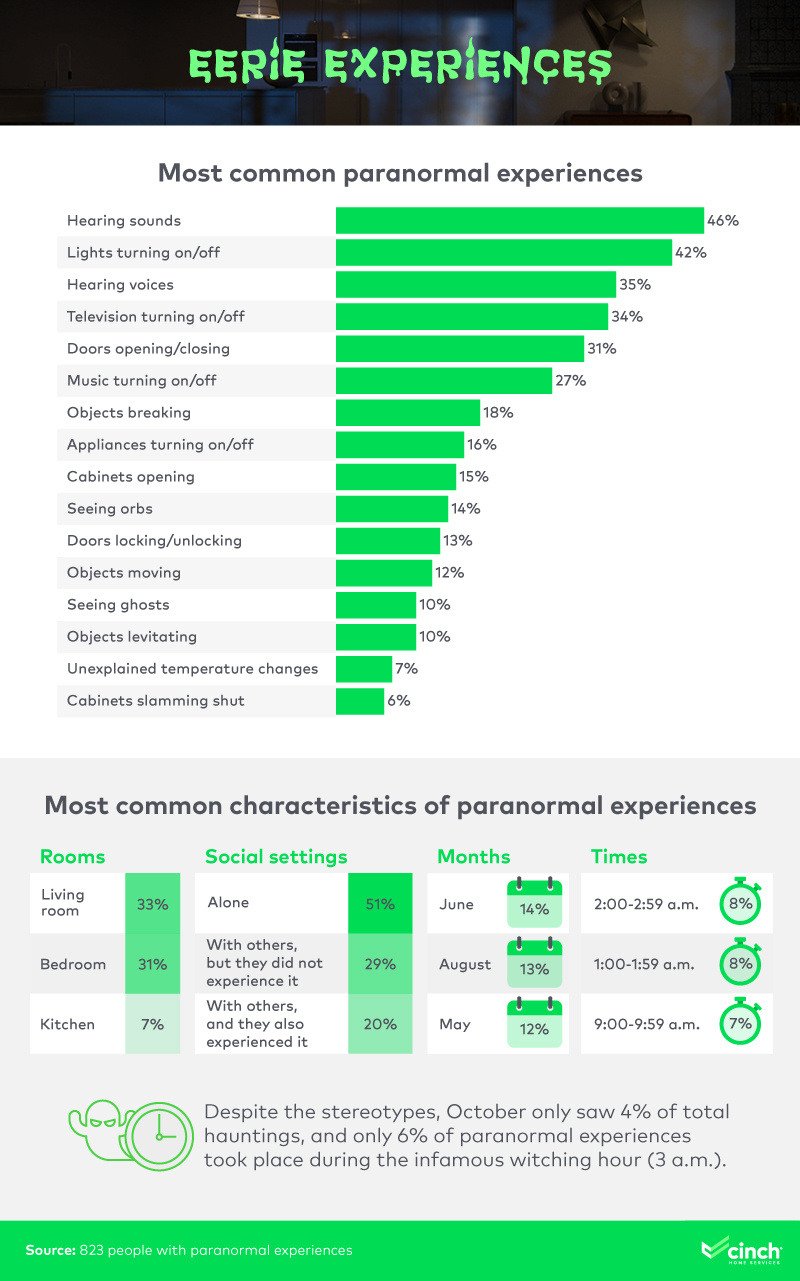
Hearing odd sounds was the most commonly reported paranormal experience. While many people have heard unusual sounds in their home, it's important to note that this group of people attributed them specifically to supernatural activity. But, for others, things escalated beyond mere noises: 42% noticed lights turning on or off, while more than a third heard voices. One in 10 claimed to actually have seen the ghost itself.
Unfortunately, most respondents were totally alone when the ghostly experience occurred. Most often, it was in the living room (33%) or bedroom (31%) and in the middle of the night – although interestingly, not necessarily during the witching hour. Similarly, October was not as spooky a time as the holidays may make it seem, laying claim to only 4% of reported hauntings. 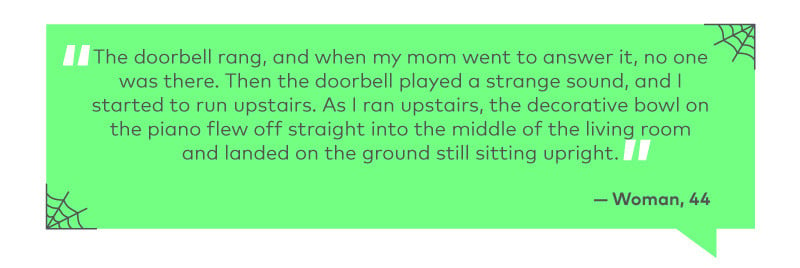
What next?
What exactly is a person supposed to do when they've been haunted? Our study asked respondents about the aftermath: their reactions, removal attempts or even possible relocations.
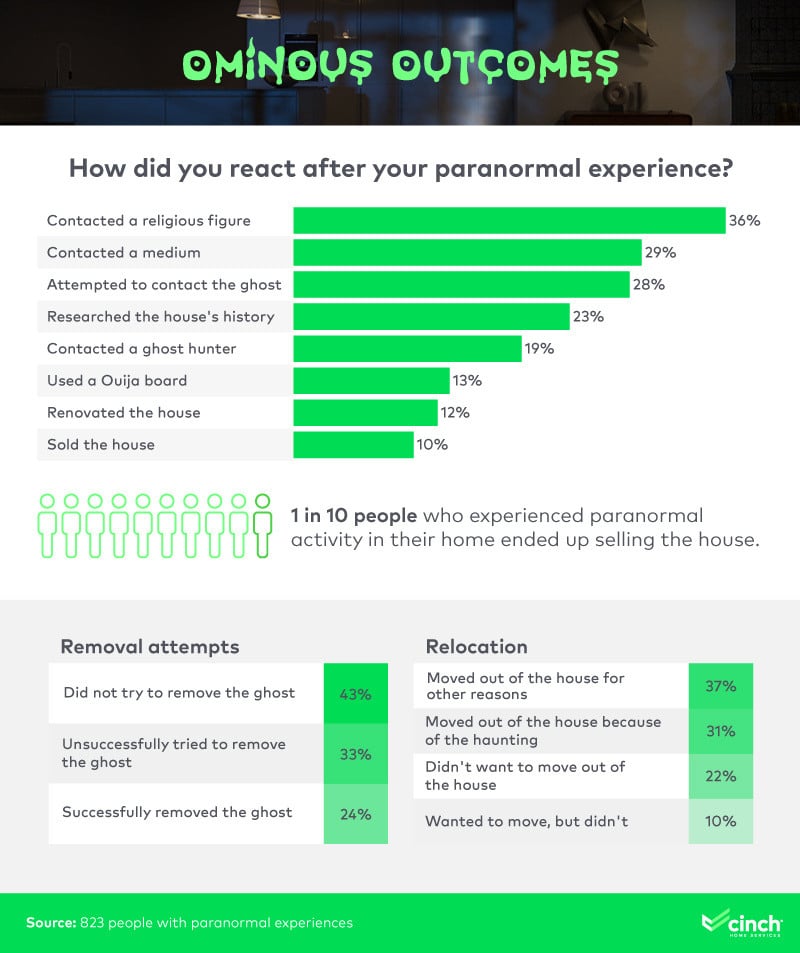
The first thing most people thought to do was involve the help of a professional, whether that was a religious figure (36%) or a medium (29%). But others chose a more DIY approach: 28% attempted to contact the ghost themselves, some started digging into the house's history (23%) and others brought out a Ouija board to handle the ghost.
While most people were not bothered with trying to remove the ghost, we noticed a fairly substantial success rate among those who were. Nearly 1 in 4 people were able to remove their supernatural guest successfully. That said, some people were not willing to stick around long enough for this outcome. Instead, 1 in 10 ended up selling their house, while 31% moved out specifically because of the haunting. 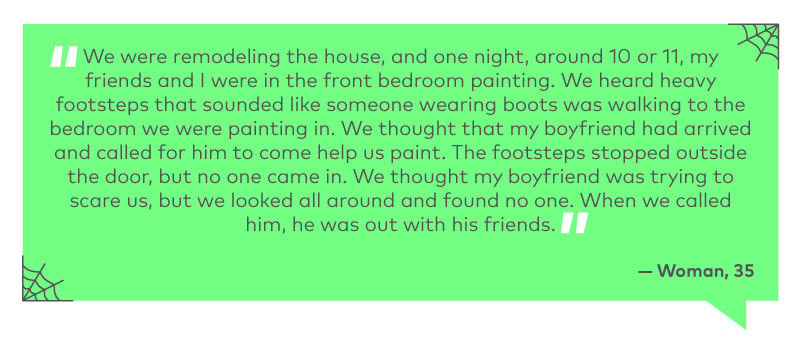
Hypothetically haunted
We also wanted to give respondents without paranormal experience a chance to explain how they believed they would handle a haunting situation. We asked what they would do and what their most and least acceptable forms of haunting were.
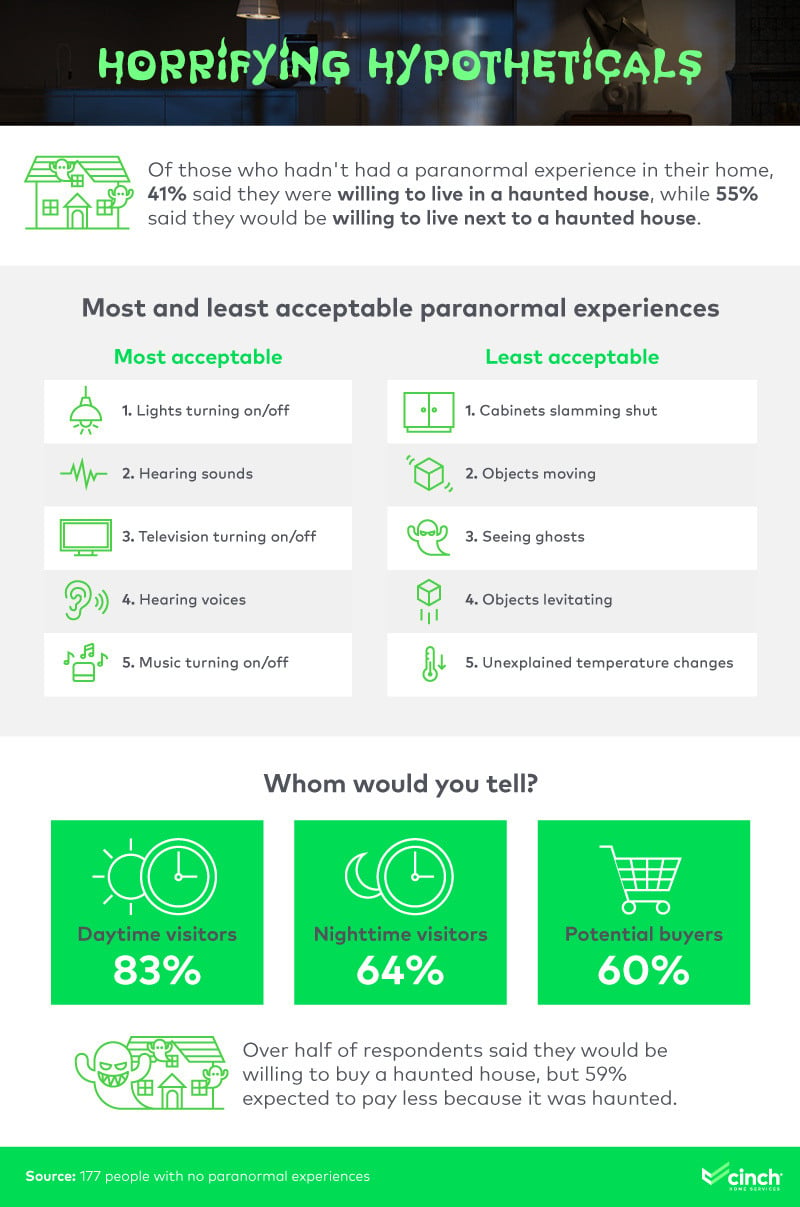
We were surprised to find that people weren't overwhelmingly opposed to living in or near haunted houses. Instead, 41% were willing to live inside a house they knew to be haunted, while 55% said they'd be happy living next door. Still, they did have some specifications: Simply hearing sounds or seeing the lights turning on or off was deemed OK, but seeing ghosts and objects moving and/or levitating was less acceptable.
But bravery or nonchalance weren't always behind a person's willingness to live in a haunted house. Fifty-nine percent expected a serious discount on the price of a possessed property. Perhaps because of this, only 60% said they would tell potential buyers about a haunting in their own house. 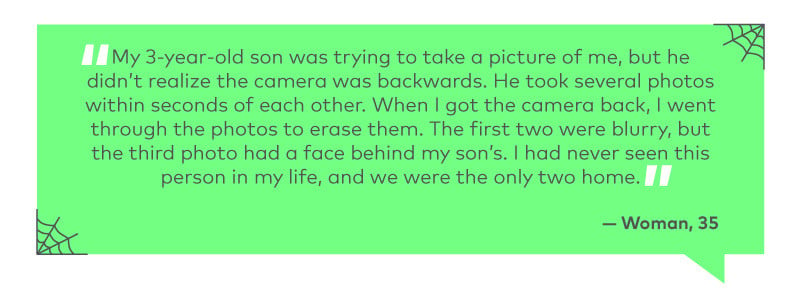
How to handle a haunting
Turning to the full pool of respondents (i.e., those with and without paranormal experiences) we asked what each person would do if they owned a haunted house.
When presented with other options, we found people were much less willing to share their home with a supernatural being. Only 14% would choose to live in a haunted house, even if they were the owner. More commonly, people would sell it (26%) or renovate it (22%), while the same percentage would tear it down and rebuild from scratch.
One in 10 respondents said they would turn the haunted space into an attraction, inviting others from the public to see and behold the spectacle. Previous studies have estimated that even small haunted house attractions can earn around $50,000 per season. A slightly higher percentage (12%) said they would try and cleanse the home.
Preventing hauntings, or adapting to them
Having a haunted house may not be as bad as the movies make out. Evidence suggests that even those who are convinced their homes are haunted are likely to continue living in them – or at least to try and fix the issue before renovating, leaving or selling. The most commonly experienced examples of paranormal activity (hearing sounds and lights turning on or off) were also among those that our respondents found most acceptable.
Ultimately, you have options if you believe your house to be haunted, and you wouldn't be unusual in choosing any of them. Whether you decide to stay or move, a reliable home services representative could make all the difference in your ability to feel safe and secure. Cinch Home Services offers elite home protection plans that help reduce the cost of appliance and system breakdowns. With fewer breakdowns, you may also hear less of those spooky noises. Head to Cinch today to get started.
Methodology and limitations
We surveyed 1,000 respondents, 823 who reported experiencing paranormal activity in their home and 177 who did not. 55% of our respondents were men, and 45% were women. The ages of our respondents ranged from 21 to 83 with a mean of 36.
Respondents were required to correctly answer an attention-check question to show that they were paying attention to the survey. The data collected rely on self-reporting from the respondents. Weaknesses of self-reported data may include exaggeration, selective memory and telescoping. We did not statistically test any of our hypotheses, and the results of this survey are purely exploratory.
Fair use statement
'Tis the season for spooky content! If you think your audience would appreciate our paranormal data, you're welcome to share this information with them. Just be sure your purposes are noncommercial and that you link back to this page.



